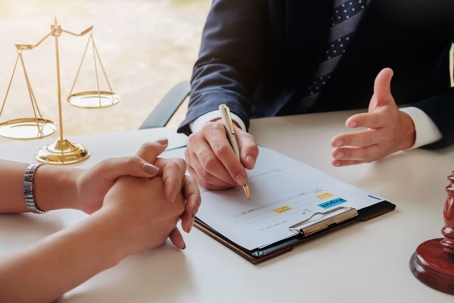Domestic Violence is an unfortunate and prevalent problem in the United States and the State of Florida is no exception. In addition to the physical scars, there are many emotional and psychological effects that result from this abuse. Outside of the respondent who caused the violence, third parties can have a significant effect on a domestic violence action in court. If your domestic violence legal action has been hindered by a third party contact your family law attorney to seek legal guidance and protection during this difficult period.
If you were a victim of domestic violence, sought protection from the court, and you were awarded a Domestic Violence Injunction, you were provided with certain protections by the court through prohibiting and limiting the actions of the respondent. However, many do not understand the extent of the injunction, and how the actions of third parties may result in a violation on the part of the respondent.
A violation of the injunction may occur in many different forms. Under Florida Statute 741.31 (4)(a), a violation occurs when the respondent: “refuses to vacate the dwelling; going to, or being within 500 feet of, the petitioner’s residence, school, place of employment, or a specified place frequented regularly by the petitioner; committing an act of domestic violence against the petitioner; an intentional unlawful threat, word, or act to do violence to the petitioner; telephoning, contacting, or otherwise communicating with the petitioner directly or indirectly, unless the injunction specifically allows indirect contact through a third party; knowingly and intentionally coming within 100 feet of the petitioner’s motor vehicle, whether or not that vehicle is occupied; defacing or destroying the petitioner’s personal property; or refusing to surrender firearms or ammunition if ordered to do so by the court.”
The provision of concern presently is the contact between the petitioner, respondent, or third party. It is generally understood that the individual named as the respondent in the injunction is prohibited from contacting the petitioner. However, the respondent may also be held responsible for the contact between third parties, and the petitioner as well. In many cases, the respondent attempts to circumvent the no contact order by indirectly reaching the petitioner through third parties such as mutual friends, or family members. These outside parties seek out the petitioner to plead and place pressure on them to drop the legal action, or pass long more threats from the respondent. Even though this form of contact is completed indirectly by the respondent, it holds the same weight and penalties as if the respondent directly contacted the petitioner.
If a respondent has committed the violation of indirect contact through a third party, the petitioner may seek aid from law enforcement immediately if the contact resulted in a fear of imminent danger. If an imminent danger is not present, you may contact your attorney to proceed with reporting the violation to the court and seeking both civil and criminal penalties. If evidence of the violation is presented, the court may hold the respondent in contempt of court resulting in financial penalties such as fines, money damages, attorney’s fees, and court costs. Criminal prosecution may also take place. If found to be guilty of violating a domestic violence injunction the respondent can be held to have committed a first degree misdemeanor with a possible sentence of imprisonment.
Domestic violence is already an emotional battle and outside party pressures can hinder both your case and your healing. Ensure you are properly advised as to your rights and the limitations implemented by a domestic violence injunction in regard to wrongful indirect contact by consulting with a lawyer. We will vigorously fight for your protection and to ensure you are able to have your voice heard with as little outside influence or pressure as possible.
Speaking to an attorney at our office in Panama City, Pensacola, Orlando, or Navarre is free of charge, and we accept calls 24 hours a day, 7 days a week. Contact us at (800) 822-5170 or complete an online contact form to get in touch with a member of our team today.

